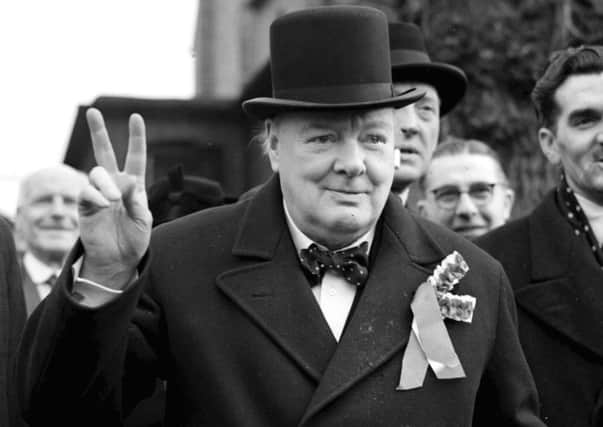Malcolm Barker: How Churchill battled with a pen and the sword


He was good at it too, and knew how to make the job pay. In 1899, after leaving the regular Army and failing to win a Parliamentary seat at Oldham, he was anxious to go to South Africa where war was brewing.
Alfred Harmsworth, owner of the Daily Mail, wired him the offer of work as a war correspondent. He promptly used this approach to lever £250 a month out of the Morning Post, a record at the time, representing spending power of some £290,000 a year in today’s money.
Advertisement
Hide AdAdvertisement
Hide AdHe was prolific, especially when out of office. His books included The World Crisis (four volumes, 1923-29), Marlborough (four volumes, 1933-38), The Second World War (six volumes, 1948-54) and History of the English Speaking Peoples (four volumes, 1953-58). On its own this would be an astonishing output, but, especially between the wars, it was supplemented by a stream of articles.
In 1953 Sir Winston was awarded the Nobel Prize for Literature. Even so, Peter Clarke in his Mr Churchill’s Profession (Bloomsbury, 2012) suggests that he could be called the most famous unknown author of the 20th century. His books are not forgotten, but they have been overshadowed by his fame as a politician and statesman, and, above all, as Britain’s wartime leader.
In fact, he is perhaps better remembered for his oratory than the millions of words from his pen.
He did not just have a way with words. He had complete mastery of them. For his famous wartime speeches he deployed phrases and sentences that, delivered in his unmistakable tones, had a wondrous effect on those enduring the dangers and privations of the 1939-45 war.
Advertisement
Hide AdAdvertisement
Hide AdThey marched out over the airwaves, encouraging the faint-hearted and communicating the belief that Britain and her Empire would win through.
Even at the darkest hour in May 1940, with France beaten and the Nazis poised for an invasion of England, he had the words for the occasion: “What is our aim? Victory, victory at all costs, victory in spite of all terror, victory, however hard and long the road may be; for without victory, there is no survival.”
So the lion roared its defiance. But it could all have been so different. A century ago, in 1915, the man we mourned 35 years later as a great national hero cast aside politics, and, by an extraordinary twist of fate, exchanged the benches of Parliament for the trenches of Flanders.
Despite being First Lord of the Admiralty at the start of the Great War, Winston had remained a commissioned officer in his Territorial Army Yeomanry unit, the Queen’s Own Oxfordshire Hussars (QOOH), which he had joined in 1902. As head of the Royal Navy, he had sent a Naval Brigade to Belgium to prevent the Germans seizing the Channel ports. The QOOH mobilised at the outbreak of war, and a month later received a telegram from the Admiralty instructing them to prepare for immediate embarkation.
Advertisement
Hide AdAdvertisement
Hide AdThey duly crossed the Channel to join the Naval Brigade, and became the first Territorials to land in France. There they remained for the duration, smartly turned-out cavalrymen who became known among foot-soldiers as “Queer Objects on Horseback.”
Winston almost certainly thought the Hussars would be delighted to get into the fighting. The great fear among the Yeomanry in the shires was that they would miss out if, as expected, it was all over by Christmas.
Churchill lost his cherished job at the Admiralty as a scapegoat for the disaster at the Dardanelles in 1915, which ended in a chastening withdrawal. Although Asquith kept him in the War Cabinet, Churchill resigned, having decided that his only honourable course was to go to the front. He went to France commissioned as a major in the Queen’s Own Oxfordshire Hussars, but served first with the 2nd Battalion, Grenadier Guards. There he was greeted coolly, the commanding officer telling him: “We were not at all consulted in the matter of your coming to join us.”
Before leaving home, Winston had been seen by friends and family buckling on his sword. However, squelching in the mud of the trenches soon convinced him that what he really needed were trench boots.
Advertisement
Hide AdAdvertisement
Hide AdHe wrote to his wife Clementine, accordingly, but all she could find in the shops was a pair of wellingtons.
He served with honour, very much at the sharp end, and as an acting Lt Col commanded a battalion of the Royal Scots Fusiliers before returning to Parliament in May 1916.
Churchill’s death, aged 90, was no great shock. Years before, he had told his private secretary, that his father, Randolph, had died on January 24, adding: “It is the day that I shall die too.” Perhaps, as he was now so ill, it did not surprise him either.”
It did, however, induce a great sense of loss among those of us who had experienced the war, even only as children. In this we were led by the Queen, who had dubbed him knight in 1953. He was accorded a state funeral, the preparations for which had been going on for some time under the code name “Hope Not”.
Advertisement
Hide AdAdvertisement
Hide AdSir Winston probably interested himself in these plans. He certainly made an insertion, leaving instructions that the Queen’s Own Oxfordshire Hussars should take precedence in the procession, thereby pushing them once again to the forefront of the action.
As the huge parade formed up, a Brigade-Major of the Guards stormed towards the QOOH contingent and complained they were not parading according to protocol. The retort from the officer in charge was: “In the Oxfordshire yeomanry we always do state funerals like this.” Sir Winston would have enjoyed that.
Malcolm Barker is a former editor of the Yorkshire Evening Post.
READ MORE...